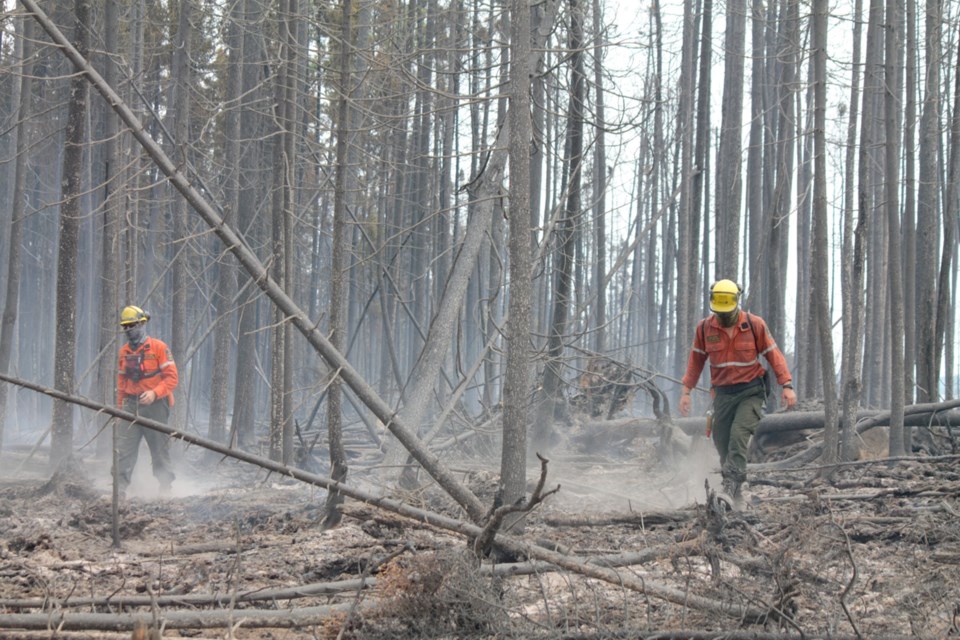The ministry’s Aviation, Forest Fire and Emergency Services (AFFES) program has begun hiring crews in Ontario for this year’s upcoming fight against forest fires – nearly one month before the season technically begins.
Ministry of Natural Resources and Forestry spokesperson Sarah Fig said they hope this move helps “ensure we are prepared to respond should fires occur before the fire season begins” on April 1.
But as recruitment and retention issues remain atop the biggest concerns for OPSEU – the union which represents fire rangers – veteran workers within the program don’t feel they’re prepared to adequately defend communities from inevitable blazes.
“It’s unheard of to start this early,” said Noah Freedman, a ninth-year forest fire crew leader. “I’ve talked to some older guys, and the earliest they had seen the fire season start was late-March. Getting called in that early is nuts.”
In addition to his role as a crew leader, Freedman is also vice-president of OPSEU Local 703.
Former employees of the program joined him, along with OPSEU president JP Hornick at Queen’s Park last week to share their disappointment with the “Ford government’s disregard for forest firefighters’ health and safety.”
Forest firefighter Noah Freedman, former forest firefighter and cancer survivor Simon Chateauvert, joined OPSEU/SEFPO President JP Hornick this morning at Queen's Park to call out the Ford government's disregard for forest firefighters' health and safety. #ONPoli pic.twitter.com/13bDBypCg4
— OPSEU (@OPSEU) February 26, 2024
Their frustrations include inadequate health and safety training, lack of compensation for work-related illnesses and diseases, and “ineffective” protection methods like using bandanas and dry cloths to cover their mouths while in action.
The ministry claims it is actively reviewing options to ensure the workers’ protection and has set up joint health and safety committees as required by law.
“These committees, representing both employees and management, play a key role in identifying necessary changes in the workplace or working conditions based on their reports,” the ministry wrote. “We will also continue to work closely with the Ministry of Labour, Immigration, Training and Skills Development (MLITSD) to assess occupational health and safety matters including coverage under legislation.”
When SooToday spoke with OPSEU last year, a union spokesperson said the fire program was down 50 crews, or 30 per cent of the province’s entire fleet.
Despite the apparent shortage, the ministry noted it collaborated with mutual aid partners to respond to over 700 fires during the 2023 season, while 576 of its 661 fire rangers supported other jurisdictions across Canada last year.
“This demonstrates their expertise in firefighting and adaptability in different settings, proving their worth as seasoned professionals,” the ministry wrote.
In 2024, Freedman projects staffing levels to remain low, even though the ministry will be upping its crews from four members to six in some cases.
“Crews are five to six people now because they’re trying to shove as many young people onto a crew as possible, even though it’s not more efficient by any means – it’s scary,” he said.
Freedman also suggested that most crews going into this season have a combined experience of ten years or less, when it was normal for crews to have 50 years of combined experience two decades ago.
He believes that could spell unwelcome news for the Sault and its surrounding communities in particular.
“The Chapleau Fire District, which covers Sault Ste. Marie, confirmed last year they had four out of ten fire crews,” he said. “I’ve heard word from other folks in the province that we might have fewer crews in Chapleau this year than we did last year. We’re losing historic numbers of people while things are getting worse.”
“It will take almost nothing to overwhelm the entire province’s resources,” he added. “If we get a couple fires like those two large ones in the Wawa and Chapleau areas last season, with as few crews as we have, we just don’t have the resources.”
In a year where the weather has been abnormally mild, Freedman feels a future disaster could be brewing if systematic changes to the ministry’s recruitment and retention strategies don’t keep up with mother nature.
“We’re definitely going to see people risking things far more than we’ve seen in years past,” he said. “With strenuous conditions comes heroism, and heroism is not something this program needs. It is a duty to protect, but it doesn’t mean that we go around risking our lives in the moment.”
“This government is constantly trying to silence us, and the reason they’ve been so successful is because they’ve surpressed us,” he added. “People are going to die, and it’s not okay.”
The ministry argues the province has implemented a number of measures to improve recruitment and retention efforts, “including initiatives like reimbursing tuition costs for recruits, providing financial assistance for safety boots, and expanding entitlements like Stand-By Pay and On-Call benefits.”
But Freedman says it’s not enough, even claiming some of these measures are a cheap stunt.
“They’re telling these young people we have an abundance of jobs, go get your training course, which costs $1,300,” he said. “If you get hired, we’ll reimburse you. But guess what? There’s no jobs. They’re using young people and their money as a political pawn. There’s no experienced staff to run fire crews, so we literally can’t hire them.”
“We have over 1,000 applicants, and I can’t tell you how many of those young people have already spent their $1,300 to get this course, but I can almost guarantee you that over 90 per cent of them aren’t going to have a job,” he added. “They’re footing the bill.”
The ministry remains adamant that the AFFES and its partners are “actively monitoring the current and forecasted weather to help predict wildland fire conditions” as spring approaches.
Recruitment is still ongoing for the 2024 fire season as applications are accepted annually between Nov. 1 and Apr. 15.
